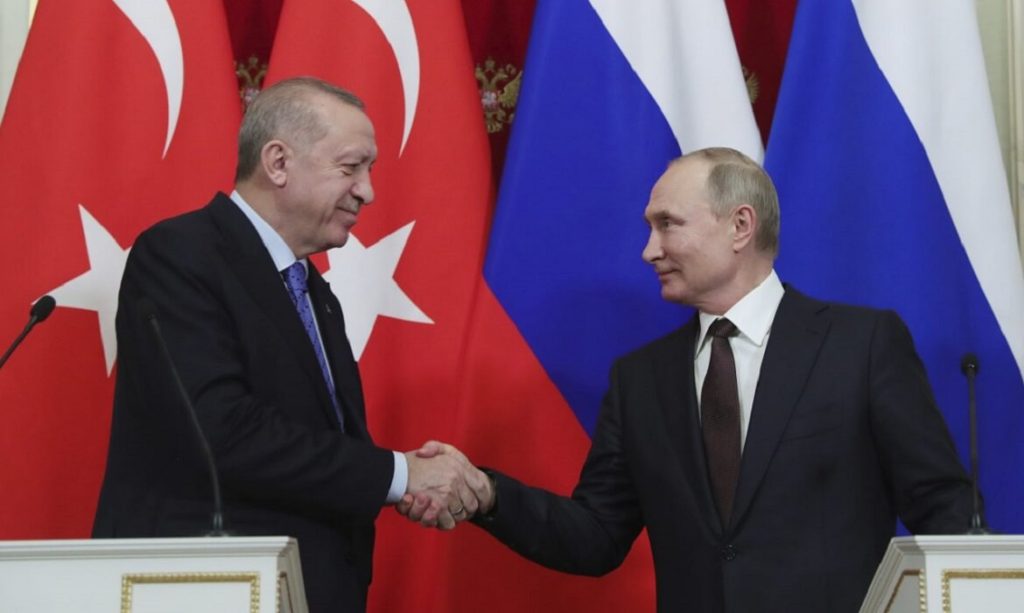By Nikola Mikovic
The Black Sea Grain Initiative, also known as the grain deal – signed in July 2022 between Russia, Ukraine, Turkey, and the United Nations – seems to be dead (at least in its old form). But Moscow’s decision to end its participation in the grain deal could lead to new lucrative arrangements between the Kremlin and its Turkish partners.

Turkey’s President Recep Tayyip Erdogan did not manage – at least for now – to persuade his Russian counterpart Vladimir Putin to extend the Kremlin’s participation in the Black Sea Grain Initiative. But that does not mean that the Turkish leader, following his meeting with Putin in Russia’s Black Sea resort of Sochi on September 4, did not get some concessions from his “dear friend”.
Ever since July 17, when Russia refused to extend the agreement that has enabled Ukraine to export grains from its Black Sea ports, Erdogan has been pressuring Putin to renew Moscow’s participation in the grain deal. Prior to the Sochi summit, he said that “the world was waiting for news on the grain corridor issue”. Previously, on August 31, Russian and Turkish Foreign Ministers, Sergey Lavrov and held Hakan Fidan, met in Moscow where they discussed the Black Sea Grain Initiative.
In other words, Russia’s potential return to the grain deal seems to have been Erdogan’s top priority, which is not surprising given that Ankara was one of the major beneficiaries of the Black Sea Initiative. On the other hand, European nations no longer seem to be interested in an unlimited import of the Ukrainian grains, given that it had an impact on their own producers. Does that mean that the Kremlin got a tacit approval from its Western partners to halt its participation the grain deal?
Putin insists that Russia will not renew the grain until its demands are met. Moscow has repeatedly demanded that its Agricultural Bank (Rosselkhozbank) be reconnected to the SWIFT international payments system, after Western sanctions banned most Russian financial institutions from accessing it. The West, however, is unlikely to lift sanctions on the Russian state-affiliated bank, since such a move would represent a sign of weakness.
Unlike the West, that is not willing to suffer any humiliation from Russia, Putin does not mind playing the role of a “naïve” leader who constantly “gets fooled” by his Western partners. Following the summit with Erdogan, he said he was “deceived” by the West and “believed Russia would get relief from sanctions slapped onto some of its agricultural products in exchange for serving humanitarian needs”.
As some Russian media noted, this is the seventh time this year that Putin accused the West of “deceiving” him. It remains unclear why Russian powerful oligarchs, especially those involved in the grain business, still tolerate such a “naïve” president.
As long as Putin is in power, he will almost certainly continue playing the victim, hoping that such a strategy will help him improve his approval ratings at home. The Kremlin propaganda machinery is there to help him. At the same time, Putin will likely seek to appease very influential energy lobbies within the Kremlin, by allowing them to develop even closer ties with Turkey.
Over the years, Russia was effectively helping Germany develop its economy by providing it with relatively cheap natural gas. Now that the Nord Stream pipelines (running from Russia to Germany) are no longer operational – and are unlikely to be restored anytime soon, if at all – Moscow, heavily dependent on the energy exports, aims to turn Turkey into a regional gas hub.
“A gas hub in Turkey will make the energy situation in the region more stable and balanced”, Putin said following the meeting with Erdogan.
Russia and Turkey are also expected to increase their nuclear cooperation. Russian Rosatom corporation is already involved in the construction of the Akkuyu nuclear plant in Turkish Mersin Province, and the fact that Erdogan and Putin discussed the construction of a new nuclear power plant in Sinop – on the northernmost edge of the Turkish side of the Black Sea coast – clearly indicates that the two nations aim to strengthen their “situational partnership”.
Still, it is not very probable that the two “friends” – Putin and Erdogan – really trust each other. Instead, the Russian leader only seems to look for ways to help the nation’s energy giants find an alternative to the European market, while for Erdogan cooperation with Moscow – be in the energy sector, or in the grain business – is a tool that could allow Turkey to reduce the consequences of the economic and financial crisis.
That is why Moscow and Ankara will undoubtedly continue developing economic ties, despite the fact that Turkey openly arms Ukraine, and even builds a drone factory in the Eastern European nation. But such “trifles” will not prevent the Kremlin from trying to help the Russian oligarchs increase business cooperation with their Turkish partners. After all, war is good for business.
Author: Nikola Mikovic – (Journalist, researcher and analyst based in Serbia. He covers mostly the foreign policies of Russia, Belarus and Ukraine)
(The views expressed in this article belong only to the author and do not necessarily reflect the editorial policy or views of World Geostrategic Insights).
Image Credit: AP/La Presse







